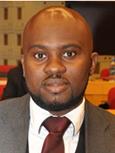
Submitted by Miss Sian Owen on Thu, 01/05/2014 - 12:25
MPhil Student DR ADOLF ACQUAYE (2005-06) acts as Lead Author for IPCC Fifth Assessment Report- Mitigation of Climate Change 2014
DR ADOLF ACQUAYE, a graduate of the 2005/06 MPhil in Engineering for Sustainable Development cohort was a Lead Author in the recently published Intergovernmental Panel on Climate Change (IPCC) Fifth Assessment Report-AR5, Working Group III (Chapter 10-Industry in Mitigation of Climate Change-2014). The report responds to the request of the world's governments for a comprehensive, objective and policy neutral assessment of the current scientific knowledge on mitigating climate change.
“It was a fantastic and exciting opportunity to be part of the research process and to know that as part of a very dynamic research team, the output of our work will potentially directly inform national and global sustainability policies and contribute to scientific knowledge. Certainly, my MPhil studies in Cambridge have been the platform on which I am developing my research career. I owe much to my studies at the Centre for Sustainable Development, University of Cambridge,” says Dr Acquaye.
After graduating in 2006, Adolf Acquaye proceeded to Dublin, Ireland where he worked on his PhD in the research area of Energy, Environment and Sustainability graduating in 2010. Before currently being employed as a Lecturer in Sustainability at the University of Kent, he was a Research Associate at the Stockholm Environment Institute, University of York and then at the Centre for Energy, Environment and Sustainability, University of Sheffield.
For full details of the IPCC Report on Mitigating Climate Change visit: http://www.ipcc.ch/report/ar5/wg3/
